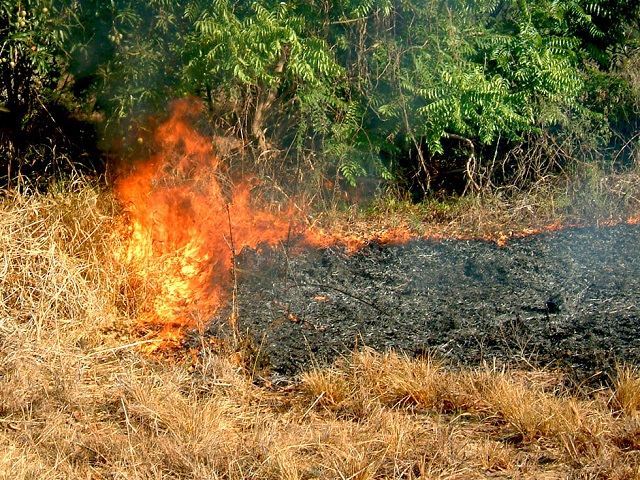
Kampala, Uganda | THE INDEPENDENT | Economic boom and population increase have often been the biggest contributor to air pollution due to heavy consumption of fossil fuel by vehicles, industries and households.
However, a new study on air quality across some parts of sub-Saharan Africa seems to suggest the opposite as research shows the region with close to 1.2 billion people is becoming less polluted.
The study published on Monday in the Proceedings of the National Academy of Sciences-PNAS reveals that dangerous nitrogen oxides, byproducts of combustion are declining across the north equatorial part of the continent.
This is linked to a decline in the longtime practice of setting dry-season fires to manage land in areas of study from Senegal and Ivory Coast in the west, to South Sudan, Uganda and Kenya in the east. In areas the study was conducted, people live as nomadic herders amid vast expanses of savanna grasslands and traditionally set fires during the November-February dry season to clear land for farming, hunting, and settlement.
But according to researchers, the steady population growth and the conversion of savanna into villages and plots for crops along with growth in incomes has seen fewer people setting fires in order to protect infrastructure and livelihoods.
“It’s nice to see a decline occurring when you’d expect to see pollution increasing,” said the study’s lead author, Jonathan Hickman, a researcher at the NASA Goddard Institute for Space Studies, an affiliate of Columbia University’s Earth Institute.
The researchers used satellite imagery to document trends in burned land and the data captured shows that the fire trend from 2005 to 2017, saw a 4.5 percent overall decrease in lower-atmosphere concentrations of nitrogen oxides during the dry season.
The density of Nitro oxide compounds are considered by many scientists to be a proxy for overall air quality. They are linked directly to asthma and premature death and once in the air, they are involved in chemical reactions that produce an array of other dangerous pollutants including low-level ozone and aerosols that can damage both crops and human health.
Hickman however says that as the population continues to grow and urbanize, more and more people will almost certainly be subjected to concentrated urban pollution which could reverse the benefits of decreased fires. While some efforts to expand monitoring of urban air quality are underway, most African cities don’t currently even measure air pollution and leave alone significantly provide to curb it.
Despite the study finding the reduced tendency in biomass burning, in Acholi sub-region,in Northern Uganda, the vice is still persisting and at an alarming rate. Here, bush fires are predominantly set by the locals to hunt for wild animals, open land and as a result of burning charcoal.
Although no research study has yet been released on the extent of wild bush fire damage in the region, its visible impacts include the destruction of local tree species, food crops in gardens, grass-thatched huts and household properties and to some extent death or injuries of locals.
For instance, in Pader and Agago districts this month alone, about 18 grass thatched huts were razed down in Pader and Agengo sub-counties while food crops and household items worth millions of Shillings were destroyed.
Author Owor, the Founder and Director of the Center for African Research says that the report is timely and attempts to highlight an issue of growing concern at the time when bush burning continues to be a thorny issue in many rural communities in sub-Saharan Africa. He however challenged the research report on the basis that its methodology was more colonial and doesn’t take into consideration the traditional aspect of bush burning.
“It does not highlight the merits of bush burning and the ways the communities especially in northern Uganda sought to mitigate this factor. Bush burning is a traditional practice that is cherished by the Acholi. The question is should it be abolished or not? And what remedies does the report provide in the context of culture?” Owor told Uganda Radio Network in an interview.
Owor says the report lends support to the whole notion of blaming rural areas in Africa for emissions at the expense of the more advanced and developed countries whose emissions are extraordinary high. Air pollution remains one of the largest global health risks and in sub-Saharan Africa in particular, air pollution was considered to become the leading cause of premature death according to 2017 study by researchers at the Earth Institute Columbia University.
In Uganda, the main sources of air pollution include emissions from vehicles, industrial activities, biomass fuel use, burning of waste, and waste management practices.
******
URN
 The Independent Uganda: You get the Truth we Pay the Price
The Independent Uganda: You get the Truth we Pay the Price





